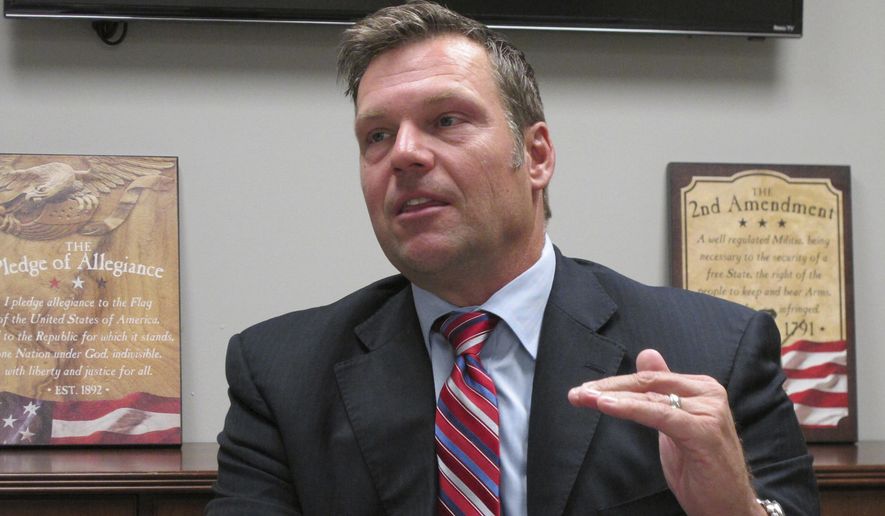Kris Kobach said Wednesday he turned down an immigration adviser’s position at Homeland Security because it doesn’t carry enough weight to be able to solve the border crisis.
Mr. Kobach, in an exclusive interview with The Washington Times, said only a position inside the White House, a “czar”-style post, would have the access and oversight to achieve what President Trump is striving for.
He said he wishes the best for Ken Cuccinelli, a former Virginia attorney general whom Mr. Trump did pick to take the as-yet undefined advisory role at Homeland Security.
But Mr. Kobach, a former Kansas secretary of state, said a non-confirmed subordinate position in one department can’t cut through the bureaucracy that’s preventing Mr. Trump from securing the border.
“I told him I wasn’t interested if I couldn’t get the job done,” he said to The Times. “It’s something that requires the White House to be directly engaged and moving the chess pieces on the table very quickly. A subordinate official at any one of those agencies isn’t going to be able to get it done.”
Frustrated by the massive migrant surge at the border, Mr. Trump last month orchestrated a shakeup at Homeland Security, ousting Secretary Kristjen Nielsen and acting U.S. Immigration and Customs Enforcement Director Ronald D. Vitiello.
Mr. Trump said at the time he wanted a tougher direction.
A month and half later, the numbers at the border are worse, and it’s unclear what steps have been taken to change the incentives that spurred a record number of families to jump the U.S.-Mexico boundary last month.
The president was considering creating an “immigration czar” position, which would have crossed department lines and coordinated strategy from the top, presumably with the direct imprimatur of Mr. Trump.
In the end, the president went with the adviser’s position at Homeland Security. It’s not clear why he squelched the czar idea.
Mr. Kobach, architect of some of the most innovative and controversial state policies to crack down on illegal immigration during the Obama years, said it will take a czar-style post to make the changes the president wants.
“I discussed with the president the position Ken is now evidently going to take, but I said I wasn’t interested in it,” Mr. Kobach said. “It requires extraordinary coordination of multiple agencies, including the Department of Defense, the Department of Homeland Security, the Department of Justice, the Department of Labor and even the Department of Interior. That can only be done effectively either from the White House or at a Cabinet-level position.
“I hope I’m wrong, and I wish Ken the best. And I hope he is able to move the needle and truly want him to succeed,” Mr. Kobach said. “But I just fear that the position of a subordinate officer, not Senate confirmed, in the Department of Homeland Security just won’t be able to get it done.”
Mr. Kobach was the target of a leak earlier this week to The New York Times, which reported on his list of 10 conditions for taking the czar’s post. Among them were an office in the West Wing of the White House and walk-in privileges to see the president — both likely critical to a job that would require cracking heads across multiple departments.
He also asked for access to a jet to be on the border weekly, time to be with his family in Kansas and a promise he’d eventually be nominated as Homeland Security secretary.
Mr. Kobach on Wednesday said he expects to continue to offer advice to Mr. Trump.
“I still meet regularly with the president to discuss immigration issues,” he said. “I stand ready to help the president in any way.”
Mr. Kobach said he would have come to the job with a list of ideas the president could tackle without needing to rely on Congress.
He’s publicly written about four of them: releasing new rules to replace the Flores court settlement that forces the catch-and-release of immigrant families living in the U.S. illegally; revoke the Obama-era policy that grants parole to asylum-seekers while they await their cases, which in practice means they get work permits and food stamps; construct massive facilities to process and hold asylum-seekers; and pressure Mexico to sign a “safe third country” deal, which would mean asylum-seekers who cross its territory could be immediately sent back over the border.
Each of those moves could help change the incentives that spurred some 65,000 family-unit migrants to jump the border last month, though the safe third country agreement may be the biggest.
“If anything’s a silver bullet, that is a silver bullet,” Mr. Kobach said. “A subordinate official at DHS isn’t going to have any authority to get that done.”
Whatever steps Mr. Trump decides on, Mr. Kobach said there are “easily 50 significant executive actions” he could do without having to go to Congress for approval.
Instead, Mr. Trump last week delivered a speech laying out a plan to revamp the legal immigration system. The speech seemed like a non sequitur coming amid a border crisis related to illegal immigration.
• Stephen Dinan can be reached at sdinan@washingtontimes.com.




Please read our comment policy before commenting.